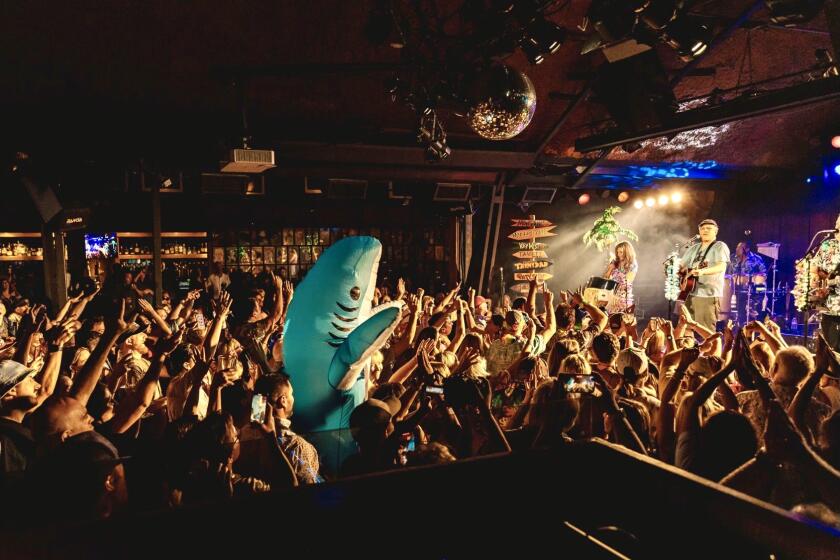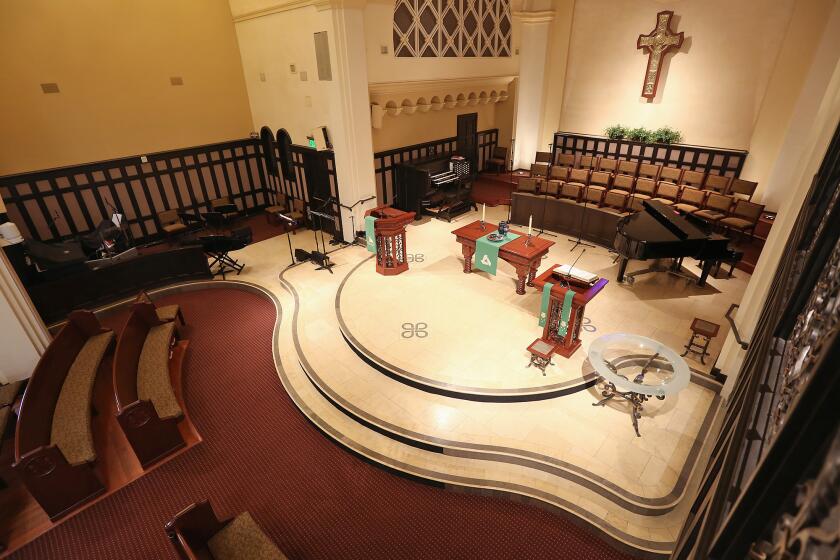AVP may leave SoCal
Leonard Armato has no intention of leaving the beach.
He doesn’t want to vacate Huntington, Manhattan or Hermosa, beach crown jewels of the annual Assn. of Volleyball Professionals tour. Since acquiring the AVP in 2001 — the same year that Surf City became a regular summertime stop on the tour — Armato, the commissioner of the AVP, has helped steer beach volleyball to new heights.
According to Scarborough Research, a firm that measures consumer shopping patterns, lifestyles and media habits locally, regionally and nationally, beach volleyball in 2005 was the fastest-growing sport in the .United States, with a fan base increase of 48%.
But Armato said Tuesday that the AVP may be forced to take down its nets and take its game elsewhere.
Citing a loss in revenue, Armato said that the AVP can’t continue to hold events on Southern California beaches without charging admission, because the AVP is losing too much money.
If the AVP does hold court in Huntington, Manhattan or Hermosa next year, then spectators will be charged to watch.
The snag, though, he said, is that the Coastal Commission says that practice cannot be allowed, as the public has the right to visit the beach for free.
“If the AVP wants to grow as a professional sport — and that is the main goal — then we have to have access to the same revenue streams as other pro sports,” Armato said.
“We should be able to sell tickets and refreshments, as well as other revenue-producing products, just as other professional sporting events do.
“Huntington, Manhattan and Hermosa are indeed the jewels, but they are the least profitable AVP events.”
Armato said the AVP is hoping to work things out with the Coastal Commission and that a decision could be made within the next 60 days.
The Coastal Commission could not be reached for comment.
The 2007 tour schedule dates have yet to be set. He said that other AVP stops — there are 16 on the current Crocs Tour, including last weekend’s Brooklyn Open in Coney Island, N.Y. — charge admission at an average ticket cost of $20.
In scheduling event sites for the 2007 tour, Dallas and Charleston, S.C., are “enthusiastic” to host an AVP event, Armato said.
Naida Osline, events planner for the city of Huntington Beach, said that the city and AVP were looking for dates to hold the tournament next May that were outside of the Coastal Commission’s time frame of Memorial Day through Labor Day, “where they could actually charge admission, which we would permit them to do,” she said, adding, “we’ve had discussions with them about this in the past. That’s where I left it with the AVP.
“Obviously, it would be a huge loss for the city. We love the AVP. It’s a great event for us and really does diversify our event portfolio. It brings all the best pro volleyball athletes to the city. We would not like to see the AVP go. We’d like to keep them here.”
A breakdown of what it costs to set up an AVP tournament event illustrates the tour’s dilemma. This year’s Huntington Beach Open was held over Memorial Day weekend, and Armato said that costs included $250,000 in prize money, another $250,000 for three hours of television coverage by NBC, $125,000 in production costs and $125,000 to $135,000 more to construct a temporary stadium that seats in excess of 4,000.
It all brings the event’s estimated cost to $1.2 million — “a little less, if television coverage is provided by a cable station.”
Armato said that the AVP is losing “roughly a half million dollars” per event on the three Southern California beaches that he calls the “epicenter of beach volleyball.”
“We’re going to do everything we can to continue to hold beach volleyball events in Huntington, Manhattan and Hermosa, but we can’t continue to bleed,” he said in regard to the revenue loss. “If you’re a true fan and want to see professional beach volleyball, then you’ll come see it. We’re asking every AVP volleyball fan to write to their council person and petition the Coastal Commission in an effort to keep the event in Huntington.
“Beach volleyball continues to grow at an amazing rate. The prize money, the star athletes have moved beach volleyball from a free, subcultural sport to a professional one.”
Mark Gold, executive director of Heal the Bay, a nonprofit environmental organization dedicated to making Southern California coastal waters and watersheds clean, presented Armato and the AVP with an award for “everything that makes the beach great” at the organization’s annual awards dinner this year.
“Obviously, we think that volleyball is one thing that makes the beach a great place to be,” Gold said. “The highest-profile issue of the Coastal Commission, which does some great things in protecting our coast, is to allow access to the beach for people to swim and surf.
“But it seems that the AVP has become a target. Imagining Southern California beaches without pro beach volleyball events is like imagining Wimbledon without tennis. It doesn’t make any sense.”
If, indeed the Manhattan Beach Open — which wrapped on Aug. 13 — is the last AVP event to be held in Southern California, then the landscape of beach volleyball figures to change.
“I don’t know how certain all of this is, but if it does happen, I’ll really be bummed,” said Rachel Wacholder, a former standout at Laguna Beach High, current resident of Redondo Beach and one of the top women’s players in the AVP. “We travel and play so much on the road now as it is. I’m hopeful that we’ll be able to continue to hold these great tournaments right in our own backyard.”
All the latest on Orange County from Orange County.
Get our free TimesOC newsletter.
You may occasionally receive promotional content from the Daily Pilot.



